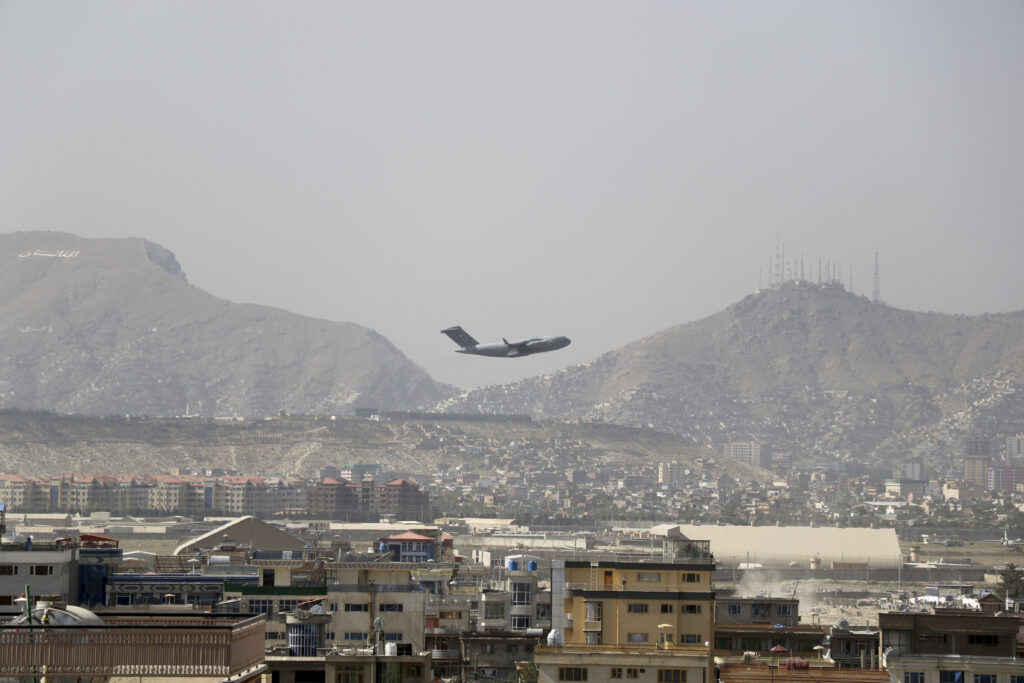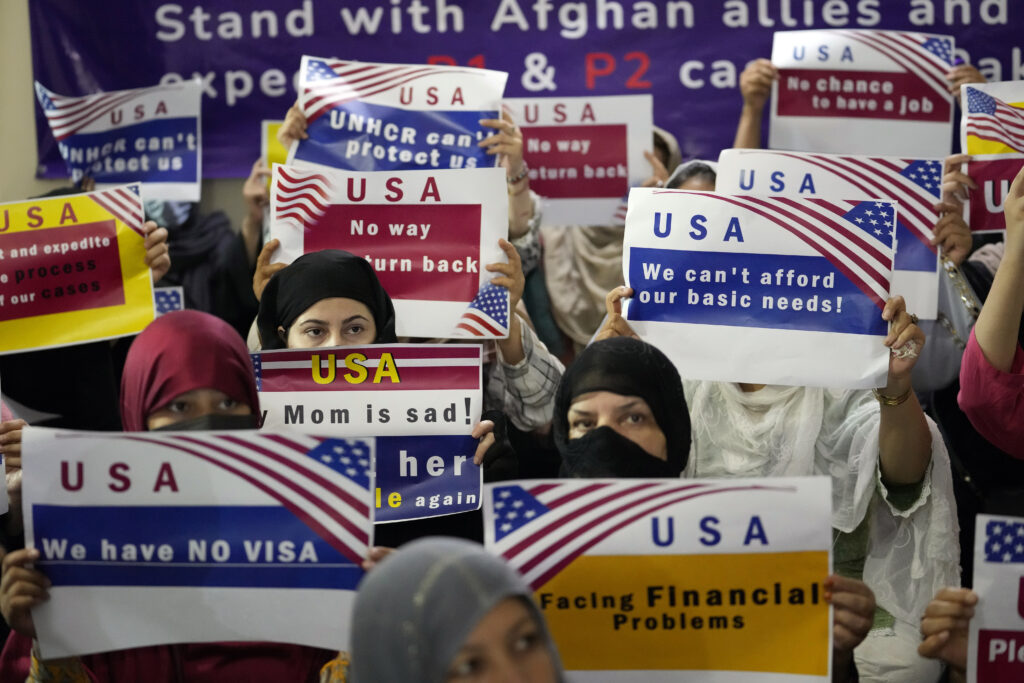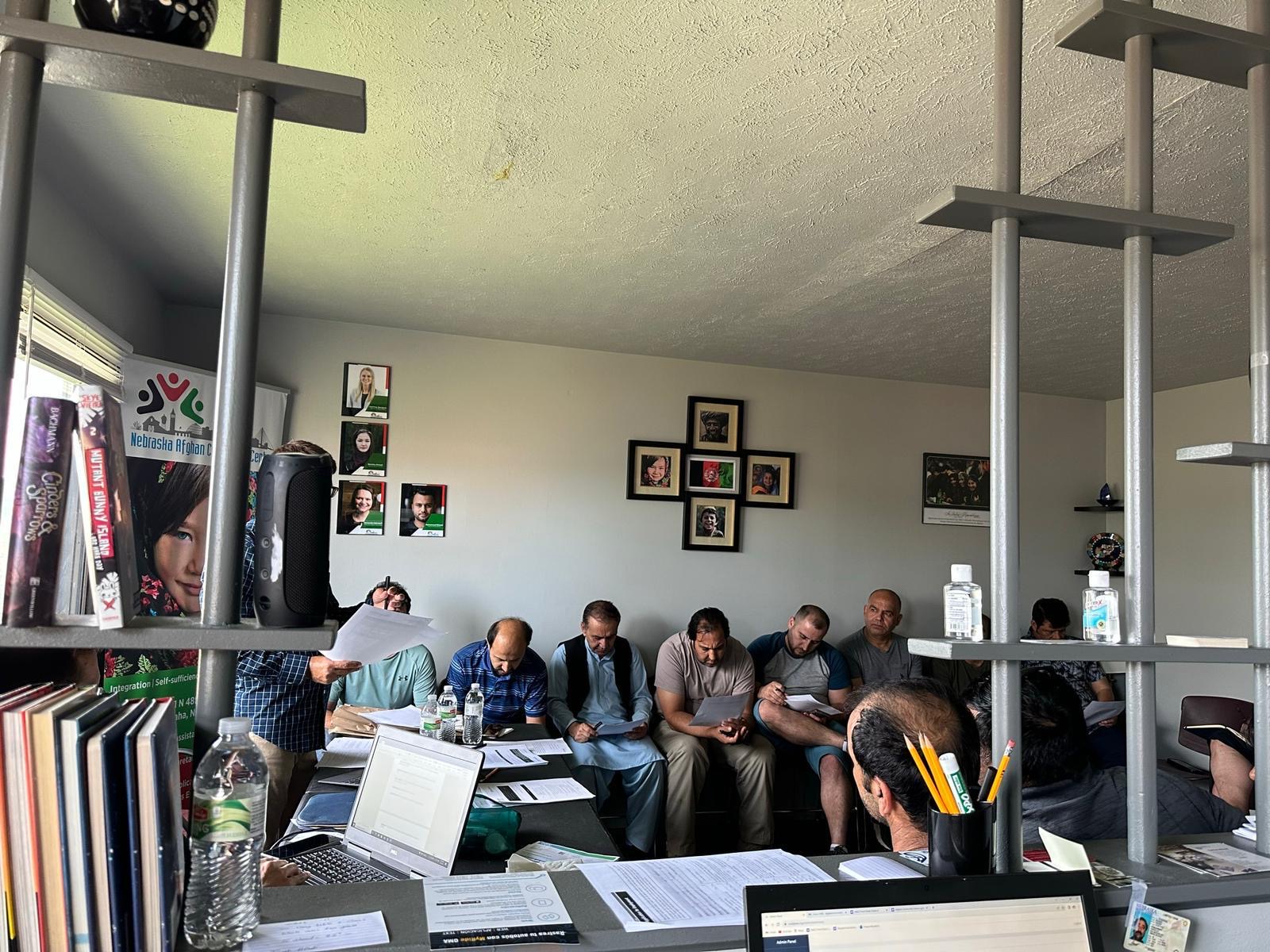As he trudged for days through the scorching jungle with about 20 other people following a nameless smuggler, Ashraf Safi felt a tinge of gratitude.
“There were children with us who had to witness everything we saw,” the father of two said. “Every time we started walking again, I told myself, ‘at least my children are not here — I have to keep moving for them.’”
Safi did keep moving. The former Afghan government employee fled his country after the Taliban swept to power, made it through the Amazon jungle and arrived at the U.S. southern border in 2022. He was hoping for asylum in the country that had occupied his own for 20 years.
Now several years removed from his journey and living in Omaha, Safi’s hope is slipping away. He’s not alone.
The Flatwater Free Press spoke to eight Afghans who crossed the southern border seeking asylum and now live in Omaha. They spoke on the condition that their real names be withheld due to safety concerns for relatives still in Afghanistan and concerns about their own status in the U.S.
All of them at one point worked for the former Afghan government that the U.S. helped stand up after ousting the Taliban. Two worked on behalf of the U.S., which should have made them eligible for a visa program created by Congress in 2009. But when America withdrew and the Taliban stormed back, they, like the other Afghans who spoke with Flatwater, feared for their lives and felt they had few options.

They all made some version of the same journey to arrive at the southern border. Their fates will be decided in Omaha’s immigration court, one of the toughest in the country when it comes to deciding asylum cases.
Two recently had their asylum cases denied and have filed appeals. The others are awaiting court dates this spring. They are all legally allowed to stay and work in the U.S. while their cases are pending.
If their asylum requests are rejected, they will have no legal basis to remain in the country and risk deportation. One decided not to wait — he left for Canada just days before Donald Trump took office.
In the days after his inauguration, Trump unveiled a torrent of policies, including a ban on asylum access at the U.S.-Mexico border, intended to end the “invasion across the southern border” and deliver on his campaign promise to “seal the border on Day 1,” according to the White House.
None directly impact asylum cases already in progress. But they have sown fear among Afghan refugees and immigrants in Nebraska, even those who arrived legally and have pending immigration cases, according to advocates and the immigrants themselves.
“Whether or not you fall under this executive order, being a refugee or immigrant means living in fear and uncertainty,” said Mohammad Sahil, founder and executive director of the Nebraska Afghan Community Center in Omaha.
For Safi, the uncertainty has left him wondering if it was worth it.
“I had to walk for seven days through the Amazon rainforest. I saw dead bodies, starvation, disease and despair,” he said. “Who endures the hell of Panama just to end up in limbo and fear in the U.S.?”
A desperate escape
When the Taliban began a door-to-door search for former Afghan government employees and U.S. allies, weeks after their takeover, Safi knew he would have to leave everything behind — his home, his family, the life he once knew.
Safi, who had worked in the government’s law enforcement agency, desperately tried to reach the Kabul airport in the last days of the U.S. withdrawal. Taliban fighters caught and beat him, he said.
About a month later, Safi moved his family from his home province to another area and applied for a humanitarian visa. Friends had told him it was the only possible route for someone in his situation.
He believed he was eligible, but the process required an interview in a neighboring country. After finding a hiding place for his family, he crossed into Pakistan, where he said he endured mistreatment by border officials. He spent months waiting before ultimately securing an interview and his visa.
He traveled from Pakistan to Dubai, then onto Brazil, with the goal of seeking asylum in the U.S.
From Brazil, he traveled by bus to Peru, flew to Ecuador, and then to Colombia, where he continued on foot and by boat. Safi said he paid smugglers to guide him through the Darien Gap — a treacherous jungle on the border of Colombia and Panama.

“I remember asking the smuggler, after seeing (the) first horrific corpse on the path, what had happened to them,” Safi recalled. “He said, ‘Who knows? Maybe they fell down or died from hunger.’”
The group of about 20 people slogging through the jungle came from many different countries, he said. Each person was allowed to carry one backpack. Food was limited.
“It felt like we were soldiers heading into battle — without any training,” he said.
Two months after leaving Brazil, Safi reached the U.S. and surrendered to the Border Patrol, hoping he could seek asylum and eventually bring his family to safety, he said. He had always seen the U.S. as an ally. He believed he would be welcomed here.
But two years later, his asylum case was denied. He has filed an appeal, but if it is rejected, he will no longer have legal grounds to remain in the country.
A growing crisis
In the year following the Taliban takeover, the U.S. granted humanitarian parole to roughly 76,100 Afghan nationals through Operation Allies Welcome, according to the Department of Homeland Security. This provided temporary protection but didn’t grant automatic residency or asylum. Those seeking asylum face a process that takes between two to five years for approval or rejection.
In Nebraska, which has resettled about 1,200 Afghans, those seeking asylum face long odds. A 2023 investigation by the Flatwater Free Press found that during an eight-month period, the judges in Omaha’s immigration court denied more than 96% of asylum applications – more than any other immigration court in the U.S.
“In Nebraska, refugee court is a losing battle,” said Alicia R. Ramos Gordin with the Center for Legal Immigration Assistance in Lincoln. “I deeply care about my clients … but if their case reaches the court, I often advise them to move to another state.”
The U.S. did create another avenue to help Afghans. Known as the Special Immigrant Visas, the program allows those who worked for the U.S. to apply for lawful permanent residence and the eventual opportunity to apply to become a citizen, according to the U.S. State Department.
However, an Inspector General report in 2022 found that the U.S. had issued visas to only 37% of the 59,977 SIV applicants deemed documentarily complete from 2009 through 2021.

Applicants must go through a 13-step process and meet a range of criteria to qualify, including having recommendation letters and other documents.
From July through September of last year, 8,794 Afghan applicants were denied visas while 1,748 applicants were granted them, according to the State Department. Insufficient documentation is a primary reason for denial.
Others like Safi, ineligible for SIV, took more perilous routes. Between 2021 and 2024, Panamanian government statistics recorded 8,294 Afghans crossing the Darien Gap — compared to just 98 between 2010 and 2020.
Qodratullah Nezami, 48, fled Afghanistan after two decades of working on U.S.-backed projects. Leaving behind his wife and four children, he believed he would be eligible for an SIV.
He didn’t anticipate how quickly everything would collapse in Afghanistan and didn’t have time to gather the necessary documents, he said. Nezami survived the Darien Gap, applied for asylum in the U.S. and ended up in Omaha. His pending application allowed him to receive a work permit and support his family from afar.
But in December 2024, his asylum case was rejected, leaving him in a state of legal limbo.
“Returning to Afghanistan is nothing but a death sentence,” he said. “The Taliban have been searching for me. My father, brother and I all worked for the U.S. force back in Afghanistan, but now, just because I entered through the wrong route, they want to send me back to my executioners. Would I have taken this risk if the U.S. had successfully evacuated everyone who worked for them?”
Policy shifts and uncertain futures
In its first month, the Trump administration suspended asylum at the southern border, banned refugees indefinitely, terminated humanitarian parole and deployed military personnel to the border.
Those and other actions have ripple effects. The U.S. Refugee Admissions Program has been paused for 90 days, halting the entry of refugees into the United States, leaving many stranded. The SIV program is also in jeopardy after an executive order suspended foreign aid, including funding for refugee resettlement.
Veterans groups responded by asking the Trump administration to make an exception for Afghans who helped the U.S., according to Stars and Stripes.
Bipartisan consensus has emerged in recent years over the need to reform the U.S. asylum system. A 2024 bipartisan border security bill would have, among other provisions, created an expedited process to adjudicate certain asylum cases and established a stricter threshold for individuals to remain in the U.S. during the adjudication process.
A lesser known provision of the bill would have expanded SIV eligibility and permanent residency status for Afghans.
While leaders in both parties negotiated and drafted the bill, Republicans ultimately abandoned the legislation after Trump called on them to oppose it ahead of the presidential election.
Many of the Trump administration’s actions have sent shockwaves through Nebraska’s Afghan community, said Sahil with the Nebraska Afghan Community Center in Omaha. His organization is trying to respond to the flood of concerns they’re hearing from families.
“An Afghan family called me yesterday asking if I could request an extra lock for their apartment because they’re afraid of ICE,” Sahil said. “Another man told me that while driving with his child, the boy insisted on taking a different route to avoid the police, even though they are legal refugees.”
Many of the administration’s actions have already triggered lawsuits. A group of immigrant advocacy organizations led by the ACLU sued to stop the administration’s ban on asylum at the southern border, arguing that the action violated laws passed by Congress and calling it “unlawful and unprecedented.” A separate lawsuit challenging the ban on refugees led a judge to temporarily block it on Tuesday.

The Taliban’s systematic targeting of former government officials, U.S. allies and activists has been well-documented by human rights organizations and the United Nations. While the U.S. does not currently have a repatriation agreement with the Taliban, the Afghans who spoke with the Flatwater Free Press said they feared that could change and they could be deported to Afghanistan.
Ajmal Shah used the same treacherous route as Safi, first escaping to Pakistan with his family before securing a Colombian humanitarian visa.
After reaching the U.S., he was placed in asylum proceedings and now has a hearing in April. His biggest concern is that his daughters, who had to return to Afghanistan, are barred from attending school. His hopes of bringing them to safety are slipping away.
“I would rather the U.S. kill me than send me back to Afghanistan, where my children will have to watch the Taliban execute me.”
Safi said he remains hopeful that his appeal will succeed, but the uncertainty weighs on him.
“I risked everything to reach safety, but now I feel like I’m trapped between two deaths — one in Afghanistan and one in this endless uncertainty. Does anyone care what happens to us?”



8 Comments
A very eye opening article, thank you for covering this topic.
Thank you, Rosemary, for taking the time to read it and leave a comment!
What can I do to help secure a place in Nebraska for those Afghans who deserve citizenship.
Thanks for your reporting, Nasrin. The richest, most wealthy country in the world, and we can’t help our brothers and sisters in need — we should all be ashamed of ourselves.
Thank you JJ!
Great reporting on such a sad situation. Just like in Vietnam we, the US, use locals and then leave them behind and fail to help them.
Thank you Cindy!
It is immoral for the US to provide incentives to Afghanis to abandon their home cities, towns, villages, and family members, particularly women and girls, to the Taliban and other criminal thugs. We’re hollowing out Afghan society.
The MORAL thing to do would be to build up social and government structures so that these Afghans could thrive in their own country…which the US was doing until Biden pulled out and then lied about it.
Did anyone notice none of these refugees live near Joe & Dr. Jill Biden?